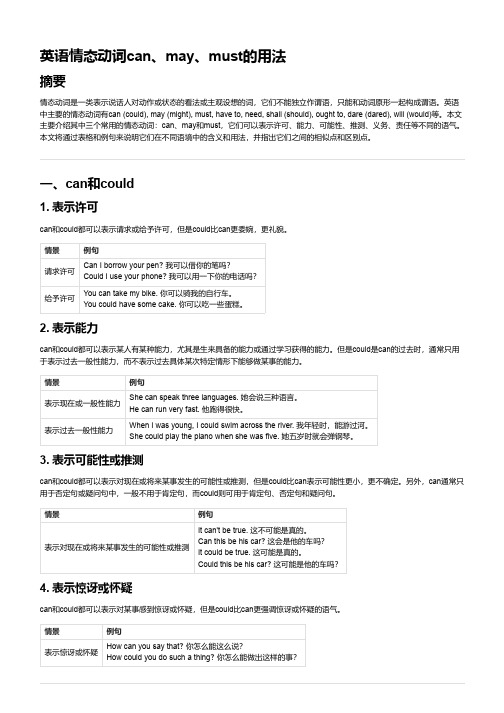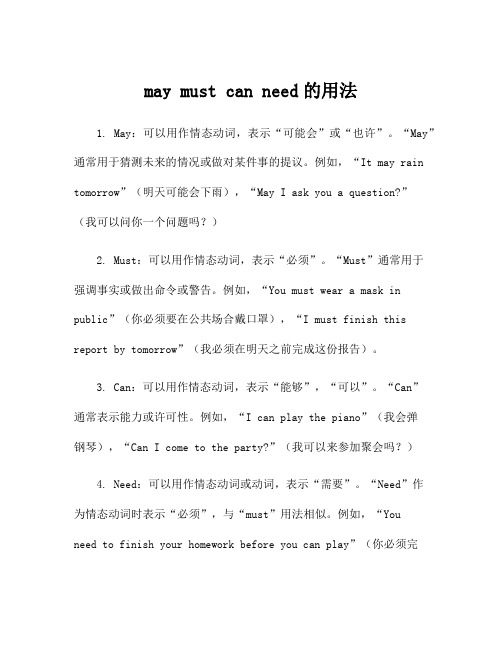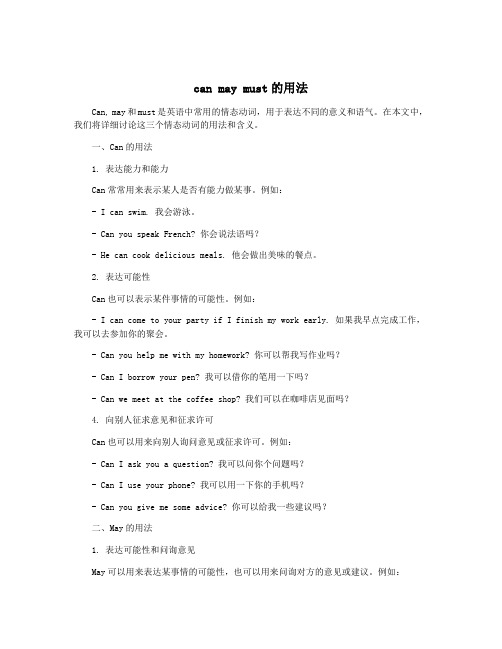情态动词can, may, must的用法
英语情态动词can、may、must的用法

英语情态动词can、may、must的用法摘要情态动词是一类表示说话人对动作或状态的看法或主观设想的词,它们不能独立作谓语,只能和动词原形一起构成谓语。
英语中主要的情态动词有can (could), may (might), must, have to, need, shall (should), ought to, dare (dared), will (would)等。
本文主要介绍其中三个常用的情态动词:can、may和must,它们可以表示许可、能力、可能性、推测、义务、责任等不同的语气。
本文将通过表格和例句来说明它们在不同语境中的含义和用法,并指出它们之间的相似点和区别点。
一、can和could1. 表示许可can和could都可以表示请求或给予许可,但是could比can更委婉,更礼貌。
情景例句请求许可Can I borrow your pen? 我可以借你的笔吗?Could I use your phone? 我可以用一下你的电话吗?给予许可You can take my bike. 你可以骑我的自行车。
You could have some cake. 你可以吃一些蛋糕。
2. 表示能力can和could都可以表示某人有某种能力,尤其是生来具备的能力或通过学习获得的能力。
但是could是can的过去时,通常只用于表示过去一般性能力,而不表示过去具体某次特定情形下能够做某事的能力。
情景例句表示现在或一般性能力She can speak three languages. 她会说三种语言。
He can run very fast. 他跑得很快。
表示过去一般性能力When I was young, I could swim across the river. 我年轻时,能游过河。
She could play the piano when she was five. 她五岁时就会弹钢琴。
3. 表示可能性或推测can和could都可以表示对现在或将来某事发生的可能性或推测,但是could比can表示可能性更小,更不确定。
情态动词小结(共五则)

情态动词小结(共五则)第一篇:情态动词小结情态动词小结情态动词有:can(could),may(might),must,have to, shall(should),will(would),need, dare, ought to等。
一.情态动词can, may, must用法㈠基本用法1.can ⑴ 会,能够--Can you swim?--Yes, I can.--No, I can‟t.⑵口语中代替may.You can(may)park here.你可以把车停在这里。
(许可)2.may允许,许可--May I come in?--Yes, you may./Sure, come on in.--No, you mustn ‟t./No, you can‟t.No, you‟d better not.3.must必须--Must we finish the exercise today?--Yes, you must.--No, you needn‟t./No, you don‟t have to.4.need 需要,必需--Need you go now?=--Must you go now?--Yes, I must.--Yes, I must.--No, I needn‟t.--No, I needn‟t.(need作为情态动词,通常用在否定句和疑问句中。
)注意一:can 与be able to 都可以表示“能力”,区别是:⑴ can只有现在和过去两种形式I can play the piano.She couldn‟t play the piano when she was a little girl.⑵ be able to ①有更多的形式和时态We shall/will be able to finish the work next week.I haven‟t been able to find the book.②指具体一次活动I can swim but I am not able to cross the rough sea.有时两者可以互换: I‟m not able to(can‟t)answer your question.Are you able to(Can you)type(打字)?注意二:could的用法⑴ 作为can的过去式,表示过去的能力。
may must can need的用法

may must can need的用法
1. May:可以用作情态动词,表示“可能会”或“也许”。
“May”通常用于猜测未来的情况或做对某件事的提议。
例如,“It may rain tomorrow”(明天可能会下雨),“May I ask you a question?”
(我可以问你一个问题吗?)
2. Must:可以用作情态动词,表示“必须”。
“Must”通常用于
强调事实或做出命令或警告。
例如,“You must wear a mask in public”(你必须要在公共场合戴口罩),“I must finish this report by tomorrow”(我必须在明天之前完成这份报告)。
3. Can:可以用作情态动词,表示“能够”,“可以”。
“Can”
通常表示能力或许可性。
例如,“I can play the piano”(我会弹
钢琴),“Can I come to the party?”(我可以来参加聚会吗?)
4. Need:可以用作情态动词或动词,表示“需要”。
“Need”作
为情态动词时表示“必须”,与“must”用法相似。
例如,“You
need to finish your homework before you can play”(你必须完
成作业才能玩耍)。
作为动词时,通常表示真正的需求。
例如,“I need help with this project”(我需要帮助完成这个项目)。
初二英语上册情态动词can may must用法归纳

初二英语上册情态动词can、may、must用法归纳1. can 的用法:(1)表示能力、许可、可能性。
表示能力时一般译为“能、会”,即有种能力,尤其是生来具备的能力.如:She can swim fast, but I can’t . 她能游得很快,但我不能。
I can see with my eyes. 我用眼睛看。
could是can的过去式。
表示过去的能力。
be able to do sth. 常常指经过努力,花费了时间和劳力之后才能做到某事。
is/am/are able to do sth was/were able to do sth.(2)表示许可,常在口语中。
如:You can use my dictionary. 你可以用我的字典。
(3)表示推测,可能性,意为“可能”,常用于否定句和疑问句中,此时can’t 译为“ 不可能”。
如:Can the news be true? 这个消息会是真的吗?—Can it be our teacher?那个人有可能是我们老师吗?—No, it can’t be our teacher. He is on a visit to the Great Wall.不可能。
咱们老师正在游览长城呢。
【例题】—I think Miss Gao must be in the library. She said shewould go there. —No. She __be there, I have just been there.A.can’tB.mustn’tC.needn’tD.wouldn’t【解析】根据下文“我刚去过那儿”可知,应为“ 不可能”,can’t 表示推测。
[答案] Acould的用法:(1)can的过去式,意为“ 能、会”,表示过去的能力。
如:He could write poems when he was 10. 他十岁时就会写诗。
(2)could在疑问句中,表示委婉的语气,此时could 没有过去式的意思。
英语常见情态动词can will may must need will 的用法

八年级情态动词的用法一、can 的用法:(1) 表示能力。
表示能力时一般译为“能、会”,即有某种能力,尤其是生来具备的能力,此时may 和must 均不可代替它。
例如:He can swim fast, but I can’t. 她能游得很快,但我不能。
She can see with my eyes. 我用眼睛看。
(2) 表示许可,常在口语中。
例如:You can use my dictionary. 你可以用我的字典。
(3) 表示推测。
表示推测时,意为“可能”,常用于否定句和疑问句中,此时can’t 译为“不可能”。
例如:Can the news be true? 这个消息会是真的吗?— Can the man be our teacher?那个人有可能是我们老师吗?— No, he can’t be our teacher. Our teacher is on a visit to the Great Wall.不可能。
咱们老师正在游览长城呢。
二、could的用法:(1)can的过去式,意为“能、会”,表示过去的能力。
例如:He could write poems when he was 10. 他十岁时就会写诗。
(2)could在疑问句中,表示委婉的语气,此时could 没有过去式的意思。
例如:Could you do me a favour? 你能帮我个忙吗?— Could I use your ruler? 我能用一下你的钢笔吗?—Yes, you can.可以。
三、may的用法:(1) 表示请求、许可,比can 正式。
例如:May I borrow your book? 我可以借你的自行车吗?You may go home now. 现在你可以回家了。
(2) 表示推测,谈论可能性,意为“可能,或许”,一般用于肯定句中。
例如:It may rain tomorrow. 明天可能会下雨。
Unit 6 Electricity情态动词can,may,must

Unit 6 ElectricityDate:_______ name:_______【知识要点】小议can,may,must情态动词有具体的词义,但也同助动词一样,需要与其他词语一起构成句子的谓语,另外情态动词没有人称和数的变化,情态动词后必须跟动词原形。
1.can的用法(1)表示能力、许可、可能性。
表示能力时一般译为“能、会”,即有某种能力,尤其是生来具备的能力,此时may和must均不可代替它。
如:She can swim, but I can't. 她能游泳,但我不能。
I can see with my eyes. 我能用眼睛看。
(2)表示许可,常在口语中。
如:You can use my dictionary. 你可以用我的字典。
(3)表示推测,意为“可能”,常用于否定句和疑问句中,此时can't译为“不可能”。
如: ---- Can the news be true? ---- No, it can't be.2.may的用法(1)表示请求、许可,比can委婉,如:May I borrow your bike? 我可以借你的自行车吗?You may go home now. 现在你可以回家了。
(2)表示推测,谈论可能性,意为“可能,或许”,一般用于肯定句中。
如:It may rain tomorrow. 明天可能会下雨。
She may be at home. 她可能在家。
3.must的用法(1) must表示主观看法,意为“必须、一定”。
如:You must stay here until I come back. 在我回来之前你必须呆在这儿。
Must I hand in my homework right now? 我必须现在交作业吗?(2)对must引导的疑问句,肯定回答为must,否定回答为don't have to或needn't。
如:--- Must I finish my homework? 我现在必须完成作业吗?--- No, you don't have to/needn't. 不,你没有必要现在完成作业。
情态动词may,can,must

情态动词may,can,must情态动词:本身有一定的词义,表示说话人的情绪、态度、语气,但不能单独做谓语,只能和其他动词原形构成谓语。
常见的情态动词有may,can,must,need 等。
1.may:表可能性,用于肯定句中,意为“可能”He may be a good father but he may not be a good husband.2.can:(1)意为“能,会”,表示能力,可指某人拥有某种能力例:She can cook.(2)意为“可以”,表示许可,常用语口语,可以用may替代例:Can I have a look?(3)意为“可能”,表示推测,常用于否定句和疑问句,此时“can’t为“不可能”例:This pen looks like mine,yet it isn’t.Whose can it be?这支笔看起来是我的,但它不是,它可能是谁的呢?Tom can’t be his brother,I know all of his brothers.Tom不可能是他的兄弟,我知道他所有的兄弟。
3.must:(1)表有把握的推测,用于肯定句,表示“一定,准是”例:May and Mary must be twins.They really look like each other. (2)其否定形式mustn’t表示“禁止,不准,不允许”例: You mustn’t swim in the lake.(3)对must引导的疑问句回答①肯定回答用must②否定回答用needn’t 或don’t have to例:---Must I finish my homework?我现在必须完成作业吗?---No, you needn’t./ No, you don’t have to. 不,你不必。
(3)must have done一定做过某事例:I see Dad’s car downstairs.He must have come home.(4)must的反义疑问句部分:助动词英语must后面的动词在非推测情况下的用法保持一致例:He must be a worker,isn’t he?You must have learned English for many years,haven’t you?练习:()1.You ______ be very tired after a 13-hour flight from New York to Shanghai.A.canB. mayC. mustD.need()2.-I can’t find my key.-It _____ locked in your room.A.mayB.maybeC.may beD.perhaps()3.-Who told him about this news?Lily?-It ____ her.She doesn’t know the news at all.A.can’t beB.mustn’t beC.shouldn’t beD.may not be()4. -Must I do my homework at once? --No,you _______.A. needn'tB. mustn'tC. can'tD. may not()5. The children___ play football on the road.A.can’tB. canC. mustn'tD. must()6. Even the top students in our class can't work out this problem, so it___ be very difficult.A.mayB. mustC. canD. need()7. -Can you speak Japanese? -No,you ________A.mustn’tB. can'tC. needn'tD. may not()8. He isn't at school. I think he ___ be ill.A.canB. willC. mustD. has to()9. —How long may I keep the book?—You ________ keep it for two weeks.A. mayB. mustC. will()10.-- May I go out now, Dad?-- No. You ______ let your mother know first.A. canB. mayC. needD. must。
can may must的用法

can may must的用法Can, may和must是英语中常用的情态动词,用于表达不同的意义和语气。
在本文中,我们将详细讨论这三个情态动词的用法和含义。
一、Can的用法1. 表达能力和能力Can常常用来表示某人是否有能力做某事。
例如:- I can swim. 我会游泳。
- Can you speak French? 你会说法语吗?- He can cook delicious meals. 他会做出美味的餐点。
2. 表达可能性Can也可以表示某件事情的可能性。
例如:- I can come to your party if I finish my work early. 如果我早点完成工作,我可以去参加你的聚会。
- Can you help me with my homework? 你可以帮我写作业吗?- Can I borrow your pen? 我可以借你的笔用一下吗?- Can we meet at the coffee shop? 我们可以在咖啡店见面吗?4. 向别人征求意见和征求许可Can也可以用来向别人询问意见或征求许可。
例如:- Can I ask you a question? 我可以问你个问题吗?- Can I use your phone? 我可以用一下你的手机吗?- Can you give me some advice? 你可以给我一些建议吗?二、May的用法1. 表达可能性和问询意见May可以用来表达某事情的可能性,也可以用来问询对方的意见或建议。
例如:- May I ask you a question? 我可以问你一个问题吗?- May I have your opinion on this matter? 我可以听听你对这个问题的看法吗?2. 征求许可和邀请May也可以用来征求许可或邀请别人做某事。
例如:- May I borrow your car? 我可以借用你的车吗?- May I have a glass of water? 我可以喝一杯水吗?- May I invite Jane to the party? 我可以邀请简来参加聚会吗?3. 表示礼貌在正式场合中,may也常常用来表达礼貌和尊重。
- 1、下载文档前请自行甄别文档内容的完整性,平台不提供额外的编辑、内容补充、找答案等附加服务。
- 2、"仅部分预览"的文档,不可在线预览部分如存在完整性等问题,可反馈申请退款(可完整预览的文档不适用该条件!)。
- 3、如文档侵犯您的权益,请联系客服反馈,我们会尽快为您处理(人工客服工作时间:9:00-18:30)。
must / must not
must的用法 的用法: 的用法 1. must表示必须 表示必须 You must do your homework first. 2. must表示 一定 肯定性推测 ) 表示 一定(肯定性推测 He must be at home.
must / must not
You must not smoke. You must not turn right.
Ⅰ.用适当的情态动词填空:。 1.I can play football. __________you swim? Can may 2.Don’t worry. You ________ return me this book tomorrow. can’t 3.My grandma is ill. You _______ talk so loudly here . must 4.I can’t play with you. I __________finish my homework first. must 5.I__________ get up early tomorrow. because I have a meeting. Can 6.______________you please open the window?
4. S1 ____ Kitty multiply _______? Can S2 _____________. No, she can’t
may / may not
may的用法 的用法: 的用法 1. 表示允许 可以 表示允许 可以) 允许(可以 May I come in? 2. 表示推测 (可能 ----通常用于肯定形式 表示推测 可能 可能) 通常用于肯定形式 She may be still waiting for us. 3. 表示祝愿 May you have a happy weekend.
情态动词can, must的用法 情态动词can, may, must的用法
Modal verbs 情态动词
• 情态动词后接动词原形 情态动词后接动词原形; • 没有人称和数的变化; 没有人称和数的变化 • 不能单独作谓语 与后面的动词共同作谓语 不能单独作谓语, 与后面的动词共同作谓语; • 其否定形式在后面直接加 其否定形式在后面直接加not。 。
What do the signs mean? Do you know?
You must not cycle.
You must not enter.
You must be careful.
You must turn left.
You must pay ten yuan. You must keep silent.
1. S1 Can Kitty spell ___ ____? S2 Yes, she can _____________. 2. S1 Can Kitty add ____ ____? S2 _____________. No, she can’t
3. S1 ____ Derek subtract ________? Can S2 _____________. Yes, he can
Modal verbs 情态动词 • can / can not • may / may not • must / must not
can / can not
1. 表示能力 会) 表示能力(会 Mary can speak English, but she can not speak French. 2. 表示允许 可以 表示允许(可以 可以) Can I use your dictionary? I can’t find mine. 3. 表示推测 (可能 ) ----通常用于否定形式 表示推测 可能 通常用于否定形式 He can’t be in the office. I saw him go out just now.
9. Nobody ___________live without air. can 10._________he speak Chinese ?Yes ,a little. Can 11. The book _________ be returned before Saturday. must 12.__________I come in ?Yes ,please. May 13. You ________give up smoking at once. It’s bad must for your health. May 14. Excuse me ._________I ask you a question? 15. __________you tell me where the station is ? Can 16. Must I finish the work now ?No, you needn’t _______ _________. You _______ do it this evening. can can’t 17. May I use your dictionary ? Sorry , you _________. I am using it now . must 18. Look at the ground .It’s very wet .It _______ have rained last night.
must not的用法 的用法: 的用法 1. mustn’t表示禁止 不准;不允许 表示禁止(不准 表示禁止 不准;不允许) You mustn’t smoke here. 2. 以must开头的疑问句,其否定回答 开头的疑问句, 开头的疑问句 要用needn’t. 要用 -- Must I clean the classroom now? -- Yes, you must. No, you needn’t.
may / may not
may not的用法 的用法: 的用法 开头的疑问句, ●以may开头的疑问句,其否定回 开头的疑问句 答用can’t或 mustn’t。 ’或 答用 ’。 --May I go home now? --Yes, you may. No, you can’t.
Answers: 1. May I carry your bag for you? 2. May I open the door? 3. May I get you a chair? 4. May I switch on the TV? 5. May I borrow your new bicycle?
